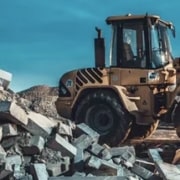Self-Build Projects in Italy
Dreaming of building your own place in Italy?
In pursuit of their Italian dream home, some people decide on self-build projects in Italy.
If you are thinking of building a house in Italy, we would always advise you to seek independent legal advice before signing any paperwork to do with a land-purchase.
Even, if on paper, it looks as if the land you are contemplating buying has outline planning permission, actually getting a building project off the ground in Italy is extremely complex.
Get Your FREE Guide to Building and Renovating Property in Italy
Our PDF guide covers everything you need to know before you start renovating or building a property in Italy
Download nowItalian self-build projects are complex. They need a team
Self-builders will need to navigate a maze of red tape. Zoning and planning laws, environmental restrictions, building permits and regulations – to list but a few.
Self-build projects in Italy really do require the help of a specialist team including an architect, surveyor, lawyer and a notary.
All-too-often, those who go it alone run in to trouble. This jeopardises or ends their self-build dream. Unfortunately, without a team, self-builders often don’t obtain all the relevant permits. This and spiralling costs, may mean that the project never gets off the ground.
Living on site during Italian self-build projects
When self-build projects in Italy do go ahead, living on-site whilst building the property is something many wish to do. Obviously there are advantages such as saving on travel time, being able to keep a close eye on progress and security.
We are often asked by self-builders if they can site a mobile home, RV, or caravan on their land without obtaining planning permission. Essentially this will depend on the designation of the land in question. Self-builders should ascertain this from local authority urban and rural plans (Piano Regolatore). Siting and installation of accommodation on land will also play a role.
Temporary accommodation
The Italian “Building Legislation and Regulation Consolidation Act” (Testo Unico dell’Edilizia) does not permit ground anchor systems for mobile homes, RVs and caravans without a construction permit. In other words, a ground anchoring system on mobile accommodation would legally classify the accommodation as a, “new building”.
However, according to the Decreto Casa, anchor systems are permissible where a temporary installation is within a proper outdoor accommodation setting, such as a camping site.
Anchoring must be temporary. It cannot be seasonal, which would imply a long, possibly permanent stay. The mobile accommodation would therefore contravene the requirements of temporariness. Also, connecting the mobile accommodation to utilities (power, water, gas etc.) implies the intention of extended or permanent use.
A construction permit with regard to mobile homes, RVs and caravans, is not necessary if the mobile home is on wheels. It must have a roadworthiness certificate and motor insurance. Installation of accommodation on a mobile support, such as a trailer, unsuitable for road transport is not permitted. The mobile accommodation must fulfil the requirements of temporariness. It must be immediately movable. This means it must be roadworthy so the owner can move it elsewhere. Anchoring is therefore prohibited. The mobile accommodation must also be autonomous in terms of utilities. This means it must have its own water, toilet and electricity.
Permanent accommodation
If the mobile home, RV or caravan is for permanent use, such as residential use during a self-build project, self-builders will require a construction permit.
Under Italian law:
“the siting and installation of accommodation during the building phase of a project does not constitute temporary status. If the accommodation has power, water and gas connections this implies long-term residence. In addition, the same principle applies to anchoring with removable devices to ensure the stability of the mobile home, RV or caravan”.
A construction permit is also necessary even if the structure is not for residential use. For example, if a self- builder uses the mobile home to store building materials or as a site-office during self-build projects. In fact, if there is evidence of regular and long-term use by the owner, the installation will be considered as permanent.
Finally …
Buying any type of property in Italy is a serious investment and often the fulfilment of a dream. Italy real estate, planning and construction laws are complex. We recommend you engage the right team of advisors in place to make your experience successful.
At De Tullio Law Firm, we have over 55 years of expertise managing cross border property law matters throughout Italy.
If you are contemplating a self-build project in Italy and you need any advice, guidance or support, please contact us. We are here to help.
Get All Our FREE Guides for Foreigners Planning to Buy, Sell or Live in Italy
Our PDF guides give you all the knowledge you need to move your Italian dream forward with confidence
Download now









